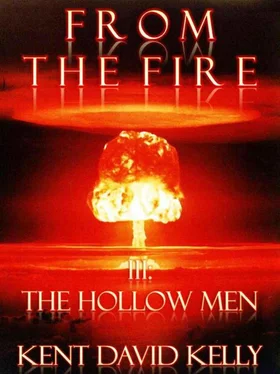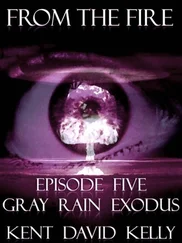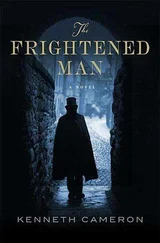She would shower, stitch her knee, clean her bandages, perform her toilet, and then she would explore. Read. Understand. No sleep. There were too many things she needed to do, now that she knew that intruders were wanting to kill her, now that she knew her daughter was alive. As she went through the elaborate and painful ritual of pulling down a parcel from the ceiling racks, sorting out some toothpaste, a bar of soap and a handful of napkins to use as washcloths, she tried to let the guilt tear its way through her faltering spirit.
After all, she wondered. Don’t I deserve this?
She tried to cry for Pete again, to mourn, but this time there were no more tears. Too tired. There was so much that had to be done, so many insignificant actions for one tiny unflinching spirit in the world.
* * *
As the “days” numbly rolled past and Sophie explored every corner of the shelter, she accomplished many things. She prioritized the binders and studied as much of Tom’s bewildering reams of information as she could. She found herself neck-deep in perplexing manifests on seed recovery, fecal reclamation, ventilation pressure control, anti-depressive memorization techniques and self-administered emergency abdominal surgery.
How much of it was idiocy, which isolate piece of trivia would one day save her life?
What she had not done, however was to turn the radio on ever again. With the beast-people still out there, the world was a far less deadened thing than she had first allowed herself to believe. She feared that if she were to listen to that static drone — especially the takk-takk ing static pulse which was particular to Mitch’s private frequency, more damning and beguiling to her than the very fruits of Tantalus — she would not be able to resist trying to call Mitch again. After all, I know how now. And whenever the desire to listen in and to wait for her daughter’s protector to be on the airwaves became almost unbearable, she would chant to herself in a sing-song, uneasy whisper:
“Caution. Channel not secure. We are in shelter. Under Aunt Jemm’s house. You know where? Have car. Can’t get out. Soph, come in three week. Three weeks, if you can. Love you. She’s alive.”
After several minutes, minutes taut with restrained tears and near to rupture, the need to listen for Mitch’s coded tapping would finally pass.
Channel not secure.
Who else was out there?
She was tempted to listen again to the frantic survivors she had heard on the NOAA band for Fort Morgan. But as the days dredged their way around her senses, her needs changed, her focus changed. She changed. The reading, the preparation, the suit-ups and gun lessons and tallies of matches and body bags in the Material Room, the weight lifting, the stitch-slicing and scab-pulling, all of these rote and mundane tasks became as one, like gravity-afflicted constellations in-swarming upon themselves as burning silhouettes to one sole and all-consuming universe, this:
Lacie is out there. Crying for you. She needs you.
Embracing this silent mantra, she did not feel as horrifically alone as she thought she might. She did feel the need to lock the medicine cabinet and to hide the key-ring from herself at the bottom of the second freezer. But the guns remained in their place, as did the untouched computer and the crumpled picture of a grinning three-year-old Lacie, replete with her toothy smears of chocolate pudding.
Sophie drove the demons away by song, by murmur, by reading everything that she could find.
Throughout all of this time, she slept on the one bunk that had clearly been meant for her. The farther one, the one with the unkempt pile of bed sheets and the tangle of pillows which marked Tom’s last sleepless night alone there, she wanted to touch that, yes. And yet, she refused herself this final gesture of intimate isolation. When she would eventually sit on that bed, when she would breathe in his scent from those pillows and smooth the creases of those sheets away, he would truly be dead forever and there would be no more specters of his presence for her to wonder about.
If she slept where he had slept, the last of him would die.
But at last, the solidity of her renewed convictions lured her to sit upon that bunk and to smooth Tom’s sleepless struggles at last away, and in doing so she came face to face with her own dead younger self’s reflection.
For the secret of Lacie’s hideaway, after all, had been hidden there down in the crumpled dark beside her all along.
That fated “night,” she did decide that she would sleep in Tom’s own bunk. Once. She moved the blankets and his uppermost pillow, intending to straighten them and to curl underneath the sheets with her face toward the wall, her breath reflecting off the glass bricks in a phantom intimation of Tom’s own breathing.
As her bandaged fingers slipped under the pillow, she found a slick and pliant square of material in the cotton casing. She pulled it out, and was greeted by a slick greenish-white square of blankness, 3.5 inches wide and 4.25 inches high. Intuitively knowing those dimensions and struggling to quiet a thrill of recognition, Sophie cried out and flipped the Polaroid over so she could see the antique image upon its face.
What she found was herself, aged nineteen with her arms poised over her head, glorying in the impossibly distant faerie-realm of Yesterday, the torrid summer of 1992. An endearingly skinny and sharp-elbowed Thomas was grinning behind her with his hands around her waist, and her arms were lifted behind her to hug the back of his head. Tom’s then-golden halo of wind-spun hair was tangling in the sunlight through her fingers, frozen forever in a moment of idle joy.
Sophie laughed and cried as she stared at this one picture Tom had slept with, the sounds and emotions coming out of her all at once.
But that house . She had completely forgotten all about it. It was a sun-bleached Victorian mansion of the Gilded Age, built upon the windblown plains of northeastern Colorado as the harbinger of a gingerbread-porched suburbia for wealthy ranchers and their romanticized ideals, dead dreams blossoming over the wake of Colorado’s dying gold rush and the merciless riot age of the Coal Strikes. But that one house only had been built, and the other dreamers and all their children and burnished fortunes had never come. In the thirties at last, the Dust Bowl arose and as far north as the Rocky Mountains the dreams had all been choked away.
The unlikely wasteland mansion had been built by a French Canadian industrialist named Conrad Henry Saint-Germain, passed down through the generations for a single-threaded bloodline of lonely authors and highly eccentric ladies. Sophie had only been there once, when Mitch had “forced” his dear annoying brother to introduce his new girlfriend, Sophie, to the odd spinster great aunt who lived out toward Kersey amongst her cats in that gingerbread monstrosity.
Jemm. Auntie Jemm.
“Oh my God!”
Sophie dropped the Polaroid and laughed into her hands. She knew, with an absolute and burning sun of conviction flaring over her heart in a surge of revelation, where Mitch had built his own survival shelter.
Under Aunt Jemm’s house. You know where?
“Oh, oh .”
Sophie rocked back and forth, her bare heels pushing off the metal frame of Tom’s old cot. It was all she could do to force herself not to throw together a pile of gear, suit up and go out into the cave and try to start up the H4 and drive headlong out to Kersey.
The memory of that illumined day came back to her in a rush. How had she ever forgotten it?
Читать дальше












